The Laureato is one of Girard-Perregaux's most important designs, with a history going back to its birth in 1975 as a quartz-based chronometer wristwatch. The first mechanical versions of the Laureato were released in 1995, with the GP caliber 3100 and this year, GP is going back to that year for inspiration, with the 2016 edition of the Laureato automatic. The vintage Laureato self-winding models are well thought of by GP fans and collectors, but the appeal of the Laureato has always been a bit niche. Does the new 2016 model have what it takes to become the break-out, entry level icon Girard-Perregaux needs? Let's take a look.
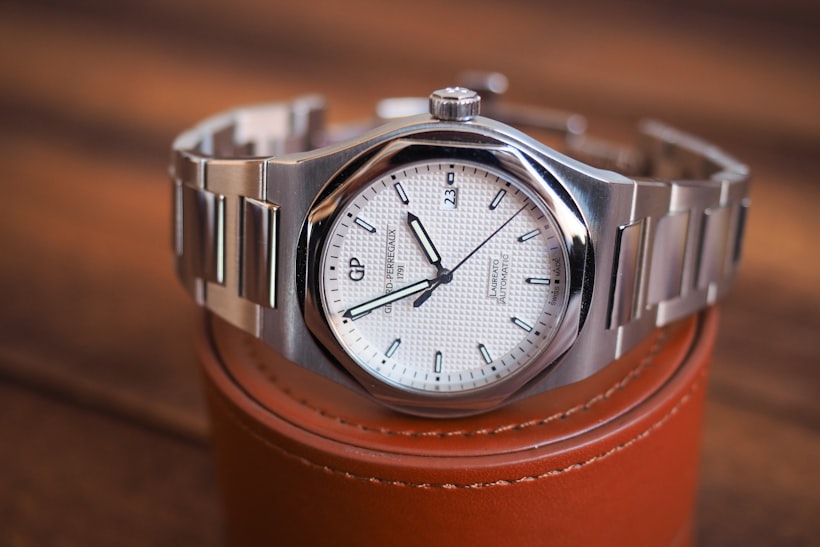
The first thing worth knowing about this new version of the Laureato is that it's definitely larger than the original self-winding model from 1995, which was 36 mm in diameter and just under 8 mm thick. That model, on the wrist, really feels like an extra-flat watch; it has a feeling of unobtrusive fineness that I found really appealing the last time I had one on (which, admittedly was some time ago, in the early 2000s but it made a very positive impression). The 2016 Laureato is a bit bigger, at 41 mm x 10.10 mm, but that is a pretty significant reduction from some more recent Laureato models, such as the Evo3 models, which were in the 44 mm range.

The case shape is just as graceful as I remember it. The octagonal bezel invites comparisons with the Royal Oak, but they really feel like very different watches; the Royal Oak has a much more overtly geometric, incisive visual language, while the 2016 Laureato, though slightly more robust than its ancestor from 1995, retains the more unobtrusive, soft, almost biomorphic lines that were so much a part of the 1995 Laureato's appeal. Other integrated case and bracelet models from the 1970s include, of course, the Ingenieur SL models and the Patek Philippe Nautilus. The Laureato didn't joint the party as a mechanical timepiece until 1995, as we've mentioned, but its basic design is clearly from the same era as those watches. In a 41 mm case I think it's a much more viable competitor to the descendants of those first-generation integrated case and bracelet designs.
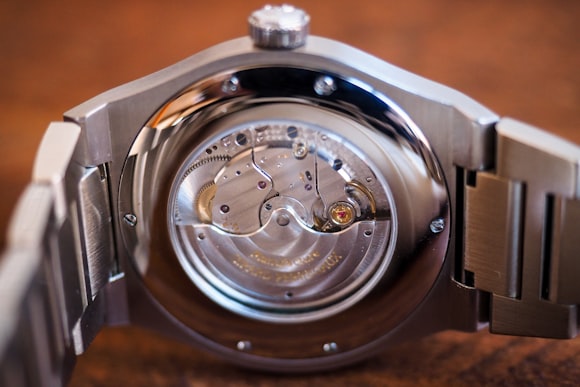
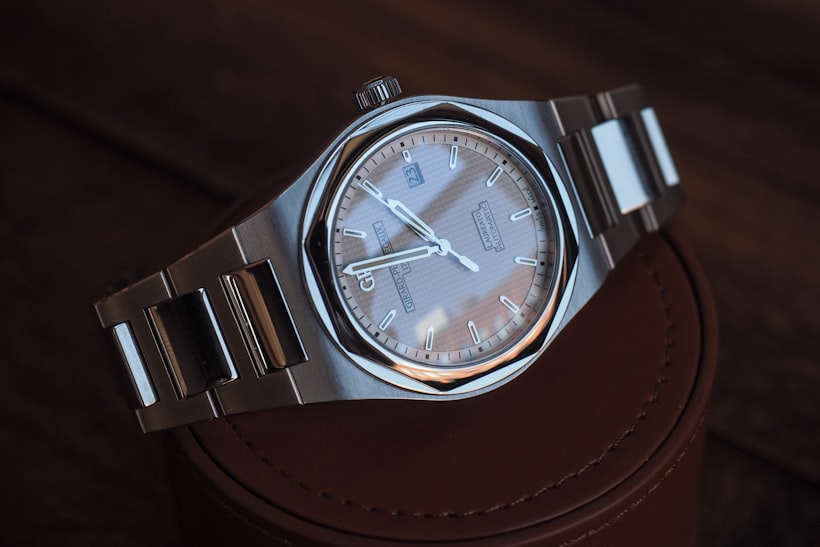
The movement is Girard-Perregaux's in-house caliber 3300-00300; it's 25.60 mm x 3.20 mm, which is quite slim – anything under 4 mm in a self-winding watch with date is getting into extra-flat territory. The dial has a hobnail/clous de Paris pattern and the combination of dial treatment with the case and bracelet finishing gives a lovely, quietly rich look to the watch – the Laureato has that feeling of self-confidence that comes from letting the design and quality of execution speak for themselves.
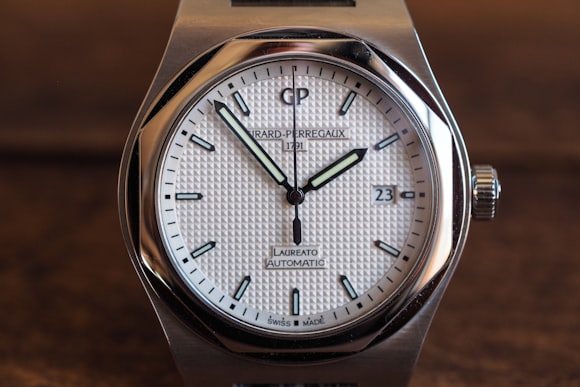
I've always felt that the Girard-Perregaux Laureato is a bit of an underappreciated watch. It appeared in 1995 as an extra-flat automatic at a time when mechanical watchmaking was really starting to get back on its feet, but at the same time over the next eight or so years, preferences among consumers began to shift towards larger and more overtly aggressive designs and the Laureato got a bit lost in the shuffle. It was a great hidden gem to discover though – very comfortable to wear, with a great extra flat movement as respectable in design and finish as anything from GP's competitors in its price range, and just enough off the beaten path to be an interesting insider's choice. I'm very glad to see it back as a wearable, time-and-date daily wear watch in GP's lineup and though for now, it's being offered as a limited edition (225 pieces in each of the two dial colors, at $14,300) I hope it becomes a permanent part of their collection – in a sub-40 mm case, at a price under $10k this would be a really attractive and much-needed addition to the underpopulated world of fine extra thin watches with in-house movements and some interesting history, in a more affordable price range.
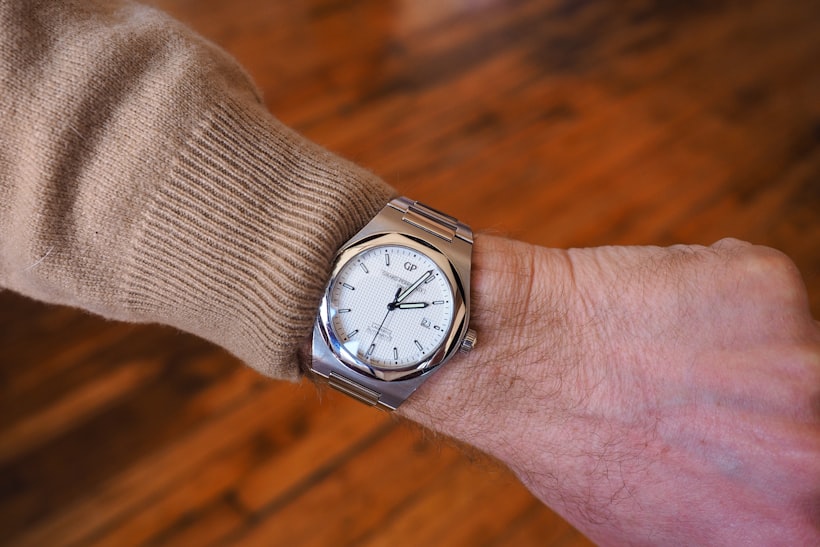
The Laureato 2016 is available in steel, 41 mm x 10.10 mm, water resistance 30 meters; sapphire display back. Dial, silvered or blue hobnail pattern (Clous de Paris). Movement, GP caliber 3300-0030, self-winding, 25.60 mm x 3.20 mm, 46-hour power reserve, running in 27 jewels, 28,800 vph. Hours, minutes, center seconds, with date. For additional info on the Laureato, see our look back at its history right here. Limited edition, 225 pieces world wide in each dial variation. Price, $14,300.
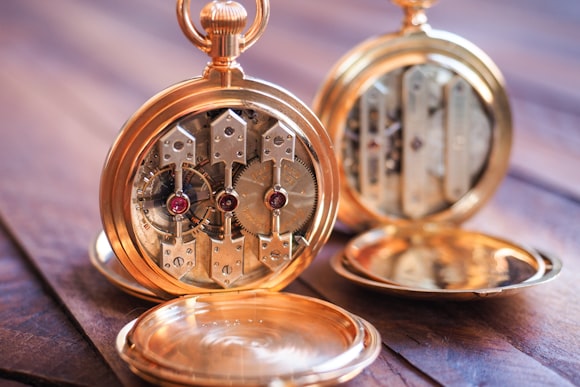
Above, two Girard-Perregaux pocket watches, including a tourbillon under 3 bridges over 150 years old. Read more about these remarkable watches right here.
Don't have the HODINKEE App yet? Get years of amazing watch content plus new stories, breaking news, and access to great new features like HODINKEE Live, free on iOS.
No comments:
Post a Comment